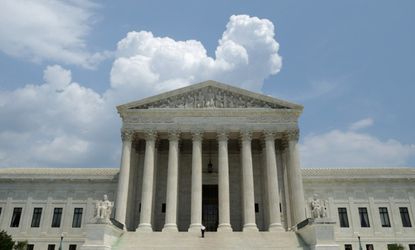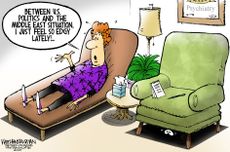Is the Supreme Court killing unions?
Here are four smart takes on Harris v. Quinn

Supreme Court Justice Samuel Alito is gunning for unions, said Sally Kohn at CNN.com. In a 5–4 decision this week, the Supreme Court ruled that home health care workers in Illinois, who are paid through Medicaid funds, "do not qualify fully as public employees, so they aren't required to contribute fees for a public sector employee union." At first glance, the ruling in Harris v. Quinn "seems narrowly tailored." Don't be fooled. This week's decision "carries broad implications," since anti-union interests will try to apply it to other types of workers and "start to chip away" at their legal right to form unions.
It could've been worse, said Michael Hiltzik in the Los Angeles Times. At the center of the case were so-called agency fees, the payments that nonunion members make to the unions that negotiate their contracts. The court has upheld the collection of agency fees since its 1977 decision in Abood v. Detroit Board of Education — when it said fees were legal so long as they aren't used to fund political activity that infringes on the payers' free speech rights. These dues remain standard in many states, "based on the principle that the public employee unions are compelled by law to represent members and nonmembers alike, so the latter should pay some of the costs of representation." The challengers in this week's case were clearly trying to get Abood overturned, because they know it "would deprive public-employee unions of their financial lifeblood." But the court's opinion "stops well short" of that goal, since it distinguishes the Illinois plaintiffs, who are supervised by a state agency but employed at the discretion of their private home health care clients, from "full-fledged public employees." Still, it's not hard to see where this is leading. In his majority opinion, Justice Alito "goes out of his way to disparage Abood," which could be "bad news for public employee unions" down the road.
It's par for the course for the Roberts court, said Laurence H. Tribe at Slate. Many state legislatures have "fiercely debated" these issues, and continue to do so. But "by giving a constitutional underpinning to the anti-union 'right to work' stance, the court short-circuited that process." It's all "part of a dangerous trend of veiling deregulatory economics in constitutional law." Perhaps it's time for the Roberts court to brush up on "one of the principal lessons of constitutionalism since the New Deal: Economic policy should be made by legislatures, not the courts."
Subscribe to The Week
Escape your echo chamber. Get the facts behind the news, plus analysis from multiple perspectives.

Sign up for The Week's Free Newsletters
From our morning news briefing to a weekly Good News Newsletter, get the best of The Week delivered directly to your inbox.
From our morning news briefing to a weekly Good News Newsletter, get the best of The Week delivered directly to your inbox.
At least the decision will keep unions on their toes, said Bloomberg View in an editorial. Whether one supports public-sector unions or not, it's not hard "to see forced payments to them as an unacceptable infringement on First Amendment rights." Regardless of whether the court revisits Abood, "public-sector union leaders will have to work harder to attract members and generate revenue." Ultimately, their future "will not be determined by the court. It will be determined by whether workers view membership as something worth paying for."
Sign up for Today's Best Articles in your inbox
A free daily email with the biggest news stories of the day – and the best features from TheWeek.com
Create an account with the same email registered to your subscription to unlock access.
Sergio Hernandez is business editor of The Week's print edition. He has previously worked for The Daily, ProPublica, the Village Voice, and Gawker.
-
 Why au pairs might become a thing of the past
Why au pairs might become a thing of the pastUnder The Radar Brexit and wage ruling are threatening the 'mutually beneficial arrangement'
By Chas Newkey-Burden, The Week UK Published
-
 'A direct, protracted war with Israel is not something Iran is equipped to fight'
'A direct, protracted war with Israel is not something Iran is equipped to fight'Instant Opinion Opinion, comment and editorials of the day
By Harold Maass, The Week US Published
-
 Today's political cartoons - April 17, 2024
Today's political cartoons - April 17, 2024Cartoons Wednesday's cartoons - political anxiety, jury sorting hat, and more
By The Week US Published